- Clone
- 2D2 (See other available formats)
- Regulatory Status
- RUO
- Other Names
- BCL2 associated X protein, apoptosis regulator Bax
- Isotype
- Mouse IgG1, κ
- Ave. Rating
- Submit a Review
- Product Citations
- publications
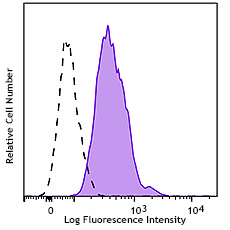
-

Human B lymphoblast cell line RAMOS was fixed and permeabilized using the True-Nuclear™ Transcription Factor Buffer Set, then stained with Bax (clone 2D2) Alexa Fluor® 488 (filled histogram) or mouse IgG1, κ Alexa Fluor® 488 isotype control (open histogram).
| Cat # | Size | Price | Quantity Check Availability | Save | ||
|---|---|---|---|---|---|---|
| 633603 | 25 µg | 128€ | ||||
| 633604 | 100 µg | 282€ | ||||
Bax is a 21 kD pro-apoptotic protein known to regulate apoptosis. Bax is found in the cytoplasm, mitochondria, and nucleus and is highly expressed in hematopoietic stem cells, ovaries, and lymph nodes. Bax binds the anti-apoptotic protein Bcl-2 as a heterodimer or forms homodimers. The relative levels of pro-apoptotic proteins such as Bax and anti-apoptotic proteins such as Bcl-2 determines whether cell death will occur following an apoptotic stimulus. Bax accelerates the opening of mitochondrial VDAC altering membrane potential and allowing cytochrome c to pass out of the mitochondria into the cytosol to initiate downstream caspase activation. p53 can transcriptionally activate the Bax gene to induce apoptosis. Bax has been shown to be mutated in some human cancers.
Product DetailsProduct Details
- Verified Reactivity
- Human
- Antibody Type
- Monoclonal
- Host Species
- Mouse
- Immunogen
- Amino acids 3-16 of human Bax protein
- Formulation
- Phosphate-buffered solution, pH 7.2, containing 0.09% sodium azide.
- Preparation
- The antibody was purified by affinity chromatography and conjugated with Alexa Fluor® 488 under optimal conditions.
- Concentration
- 0.5 mg/ml
- Storage & Handling
- The antibody solution should be stored undiluted between 2°C and 8°C, and protected from prolonged exposure to light. Do not freeze.
- Application
-
ICFC - Quality tested
- Recommended Usage
-
Each lot of this antibody is quality control tested by intracellular flow cytometry using our True-Nuclear™ Transcription Factor Staining Protocol. For flow cytometric staining, the suggested use of this reagent is ≤1.0 µg per million cells in 100 µl volume. It is recommended that the reagent be titrated for optimal performance for each application.
* Alexa Fluor® 488 has a maximum emission of 519 nm when it is excited at 488 nm.
Alexa Fluor® and Pacific Blue™ are trademarks of Life Technologies Corporation.
View full statement regarding label licenses - Excitation Laser
-
Blue Laser (488 nm)
- Application Notes
-
Clone 2D2 has been shown to be useful for Western blotting1, immunoprecipitation2, immunofluorescence3 and immunohistochemical staining3 of formalin-fixed and paraffin-embedded tissue sections. This antibody does not cross-react with Bcl-2 or Bcl-XL proteins.
Clone 2D2 does not show specificity for mouse BAX. - Application References
-
- Hsu YT, et al. 1997. J. Biol. Chem. 272:13829. (WB)
- Cartron PF, et al. 2004. FEBS Lett. 578:41. (IP)
- Pucci S, et al. 2009. Cell Cycle 8:473. (IF, IHC)
- Product Citations
-
- RRID
-
AB_2562172 (BioLegend Cat. No. 633603)
AB_2562172 (BioLegend Cat. No. 633604)
Antigen Details
- Structure
- Forms homodimers and heterodimers with Bcl-2, approximately 21 kD
- Distribution
-
Cytoplasm, mitochondria, nucleus; expressed in hematopoietic stem cells, ovaries, lymph nodes
- Function
- Induces cell death through the process of apoptosis by acting on mitochondria
- Interaction
- 14-3-3 theta, VDAC1, Bcl-2, solute carrier family 25, mitochondrial carrier member 4
- Cell Type
- Hematopoietic stem and progenitors
- Biology Area
- Apoptosis/Tumor Suppressors/Cell Death, Cell Biology, Immunology
- Antigen References
-
1. LeBlanc H, et al. 2002. Nat. Med. 8:274.
2. Marzo I, et al. 1998. Science 281:2027.
3. Miyashita T et al. 1995. Cell 80:293.
4. Oltvai ZN, et al. 1993. Cell 74:609. - Gene ID
- 581 View all products for this Gene ID
- UniProt
- View information about Bax on UniProt.org
Related FAQs
Other Formats
View All Bax Reagents Request Custom Conjugation| Description | Clone | Applications |
|---|---|---|
| Purified anti-Bax | 2D2 | WB,IP,IHC-P,ICC |
| Alexa Fluor® 488 anti-Bax | 2D2 | ICFC |
| TotalSeq™-B1106 anti-Bax Antibody | 2D2 | ICPG |
Customers Also Purchased
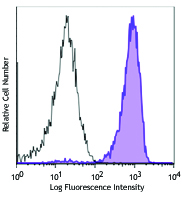
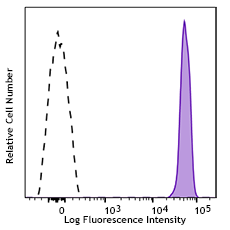
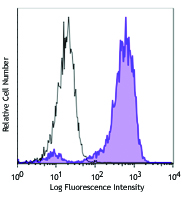

Compare Data Across All Formats
This data display is provided for general comparisons between formats.
Your actual data may vary due to variations in samples, target cells, instruments and their settings, staining conditions, and other factors.
If you need assistance with selecting the best format contact our expert technical support team.
-
Purified anti-Bax
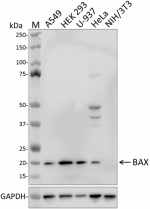
Whole cell extracts (15 µg total protein) from the indicated... -
Alexa Fluor® 488 anti-Bax
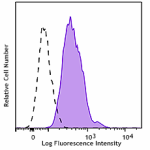
Human B lymphoblast cell line RAMOS was fixed and permeabili... -
TotalSeq™-B1106 anti-Bax Antibody

 Login / Register
Login / Register 












Follow Us